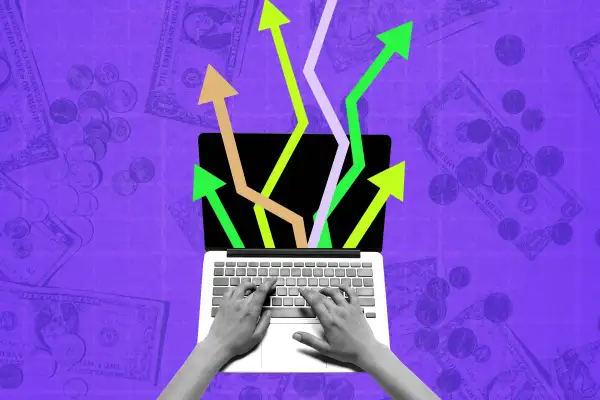3 Money Moves People Are Making Because They're Nervous About the Economy

In a new survey, nearly 4 in 10 employees said they are staying at their jobs because of economic jitters. It's just one of several signs that anxious Americans are making some interesting money moves in response to an unusual economic moment.
People are also scaling back retirement contributions, adjusting shopping habits and rethinking investment approaches as consumer debts rise and spending slows. (Specifically, consumers are shelling out less money on items including appliances, clothing and cars.)
Economic uncertainty and tariff news have been leading the headlines, but the outlook has improved from a couple of months ago. In the stock market, "April showers brought May flowers," according to a Bank of America report Tuesday. With stocks up 6.3% last month, it was the S&P 500's best May since 1990.
Still, the unfolding tariff drama continues to roil the stock market. On Tuesday, the White House confirmed a higher 50% rate for tariffs on steel and aluminum. The news came after a trade court temporarily blocked some tariffs last week, sending stocks higher on hopes of de-escalation, only for an appeals court to reinstate them a few days later.
Meanwhile, tensions are brewing between Fed Chair Jerome Powell and the White House over bringing down interest rates. And while Senate Republicans say they are about to deliver "the largest tax cut in American history," giving Americans "relief after four years of soaring prices," Democrats counter that the bill is too expensive and would hurt families.
It's a lot to process. According to Northwestern Mutual, 69% of Americans now report that financial uncertainty has made them feel depressed or anxious, up eight percentage points since 2023. A trio of reports released this week point to some money moves people are making to navigate the instability:
Cutting back retirement contributions
About 4 in 10 workers (39%) are reducing 401(k) contributions amid economic uncertainty, according to a Morgan Stanley report last week. They are cutting back specifically due to concerns about inflation or a possible recession. "This is particularly pronounced among Gen Z workers at nearly half (48%)," the report said.
Some advice? Don't create unnecessary stress for yourself by panic-checking retirement savings accounts like 401(k)s, where your investment horizon is usually long enough that short-term volatility is irrelevant. Continue making your automatic contributions and even consider periodically increasing your retirement savings rates. You'll be dollar-cost averaging into the market and will end up buying some assets at a discount during volatile periods.
Staying at their job
A similar share of workers, 38%, report that they're staying at their job "solely due to economic uncertainty," according to a 24 Seven report.
However, employers that depend on workers' uneasiness about the economy to retain staff could be in trouble.
"As economic conditions stabilize, companies that are relying on external factors for retention rather than positive engagement could face a spike in turnover," the report said.
Cooking at home
Earlier this week, Campbell’s CEO Mick Beekhuizen said in an earnings call that a surge of Americans are cooking at home, likely to avoid high prices at restaurants and take some pressure off their wallets. The company is seeing "the highest levels of meals prepared at home since early 2020," he said, drawing a comparison to the uncertainty of the pandemic era. "Additionally, consumers are favoring ingredients that help stretch tighter food budgets."
Warehouse clubs and discount stores have also reported strong sales in recent months, continuing to attract business from budget-conscious shoppers. Overall, it seems uncertainty is acting as a nudge for people to be a little more deliberate with their hard-earned dollars. Even fast-food outlets such as McDonald’s have warned of slower consumer spending and are seeing a stronger preference for their value offerings.
More from Money:
5 Best Job Search Sites of 2025
Recent College Grads Are Discovering That a STEM Degree Doesn't Guarantee a Stable Job
AI Can Help You Write a Better Cover Letter (If You Use It Right)
